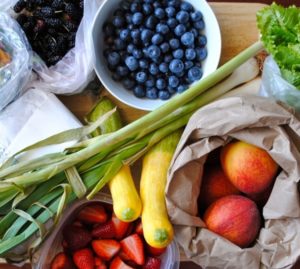
Rinse
Run cold, drinkable water and use your hands to wash the outside of the produce item. Even if the fruit or veggie has an outside that you aren’t going to eat, like a potato you plan to peel or a grapefruit you’re not using the rind from, it is necessary to wash it. Otherwise, when you cut into the item, your knife and cutting surface can transfer any dirt and pesticides from the outside to the edible part. Always rinse each item before you use or eat it. Do not use dish or hand soap – cold water does the job without giving it a soapy taste.
Soak
Some veggies that are difficult to thoroughly wash may require a soak. Cauliflower, broccoli and grapes are great examples. It would take a lot of time and effort to individually scrub these produce items. Instead, fill a bowl with cold water and let each individual item soak for 1-2 minutes. This will remove pesticides, germs and dirt from the outside and allow you to safely eat it.
Wash
If you want to use a more powerful cleaning agent than plain water, use a solution of 10 percent vinegar and 90 percent water. Spray it on the produce and let it sit for a minute. Then rinse it off with straight water and you’re good to go. For tough-skinned items like potatoes and apples, you can use a vegetable brush to really get any dirt and chemicals off. Just be sure the bristles are not puncturing the outside skin of the item.
Even little doses of pesticides or microbes on produce can make a person sick with diseases like E. Coli or Salmonella. A quick rinse or soak of the fruits and veggies can greatly reduce your likelihood of becoming ill because of something you didn’t wash off.

